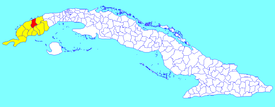Viñales
| Viñales | |
|---|---|
| Municipality | |

Overview of Viñales
|
|
 Viñales municipality (red) within Pinar del Río Province (yellow) and Cuba |
|
| Location of Viñales in Cuba | |
| Coordinates: 22°36′55″N 83°42′57″W / 22.61528°N 83.71583°WCoordinates: 22°36′55″N 83°42′57″W / 22.61528°N 83.71583°W | |
| Country |
|
| Province | Pinar del Río |
| Settled | 1871 |
| Established | 1878 |
| Area | |
| • Total | 704 km2 (272 sq mi) |
| Elevation | 135 m (443 ft) |
| Population (2004) | |
| • Total | 27,129 |
| • Density | 38.5/km2 (100/sq mi) |
| Time zone | EST (UTC-5) |
| Area code(s) | +53-48 |
Viñales is a small town and municipality in the north-central Pinar del Río Province of Cuba.
The town consists mostly of one-story wooden houses with porches.
The municipality is dominated by low mountain ranges of the Cordillera de Guaniguanico such as Sierra de los Órganos. Typical outcrops known as mogotes complete the karstic character of the landscape.
Before European settlement, the area was the home of a remnant Taíno population swelled with runaway slaves.
The area was colonised at the beginning of the 1800s by tobacco growers from the Canary Islands, who settled in the Vuelta Abajo region.
The first settlement in Viñales is documented in 1871, in the form of a ranch belonging to Don Andrés Hernández Ramos.
The town was established in 1878 as a typical community, with church, school, hospital and recreation park.
Viñales is an agricultural area, where crops of fruit, vegetables, coffee and especially tobacco are grown by traditional methods. Fishing is also an important part of the area's economy.
Tourism centered on the Viñales Valley is developing, the area being protected by constitution since February 1976, and declared a national monument in October 1978. The Viñales Valley has been listed as a UNESCO World Heritage Site since November 1999, for the outstanding karst landscape and traditional agriculture as well as vernacular architecture, crafts and music.
Attractions in Viñales include the Viñales Municipal Museum, Casa de Caridad Botanical Gardens, Museo Paleontológico, Palenque (a Maroon village) and the nearby caves (Cueva del Indio, Cueva de José Miguel, Cueva de Santo Tomás) in Valle de Viñales National Park, which were refuges for runaway slaves. There is also a cave that doubles as a nightclub.
...
Wikipedia

